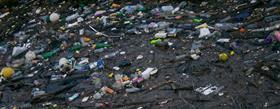
Greenpeace is calling on other UK supermarkets to follow Iceland’s lead by taking steps to eliminate single-use packaging.
The NGO's petition to 'ditch throwaway plastic packaging' follows an announcement from the frozen food specialist on 16 January that it plans to remove all plastic packaging in its own brands by 2023.
The move will affect more than 1,000 products, including fresh and frozen fruit and vegetables.
In its place, Iceland will use paper packaging, pulp trays and paper bags that are fully recyclable through domestic waste collection or in-store recycling facilities. And the supermarket will begin by launching new food ranges in the coming months that have paper instead of plastic trays.
Greenpeace called the Iceland announcement “huge” but said that, as well as going plastic-free with their own brand packaging, there are other steps retailers can take to reduce their plastic footprint.
The environmental NGO is urging supermarkets to reduce the amount of plastic produced by trialling dispensers and refillable containers in store and via home deliveries.
“This will go a long way in reducing the nearly 1.1 million tonnes of plastic packaging consumed in UK households every year,” wrote Tisha Brown, a campaigner on Greenpeace’s oceans team.
“Looking beyond their own brands, supermarkets can also push national suppliers to eliminate non-recyclable plastics and pressure them to stop using single use plastic all together.
“Tackling plastic bottle pollution is also something that supermarkets can help with,” she added.
Every day, 16 million plastic bottles in the UK end up in the environment, according to Greenpeace, and they are one of the most commonly found items on the ocean’s surface and during beach cleans.
“By supporting bottle deposit return schemes (DRS), supermarkets can help be the driving force to see this change,” Brown wrote.
Schemes like these are used in many countries around the world and have been credited with increased recycling rates for plastic bottles to up to 96 per cent, according to Greenpeace.
As well as supporting DRS, supermarkets can also install free water fountains and water refill stations to cut down on the number of water bottles in circulation, the charity suggested.



